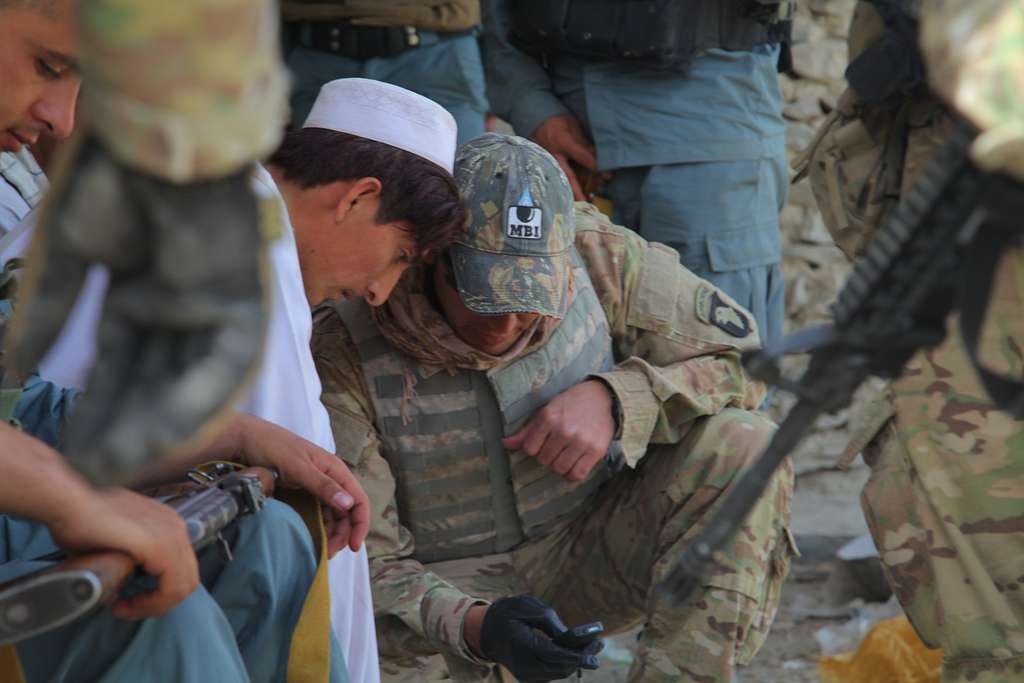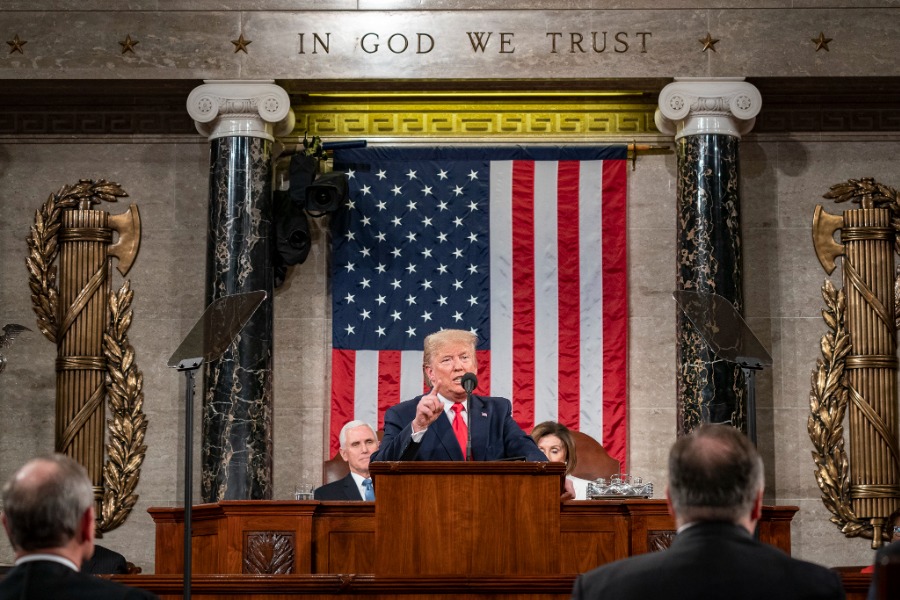An Addendum on the Constitutionality of Presidential War Powers
With one exception, I agree with Jack’s post on the OLC perspective on the constitutionality of President Trump’s Syria strike. Jack writes about Trump's strike:
Published by The Lawfare Institute
in Cooperation With

With one exception, I agree with Jack’s post on the OLC perspective on the constitutionality of President Trump’s Syria strike. Jack writes about Trump's strike:
It is a remarkable fact about the U.S. Constitution that 228 years after its creation, we still don’t know what limits, if any, it imposes on unilateral presidential uses of military force. The original understanding of Congress’s power to “declare War” and the president’s power as chief Executive and “Commander in Chief” are contested.
Based on relatively recent academic work in this area, originalist constitutional scholars have now arrived at an understanding of presidential and congressional war powers that, in my view, is conclusive. Some still resist the new consensus. And there are issues around the periphery that can still be reasonably contested. But at the core of the question—under the original meaning of the Constitution, who has the power to decide to initiate foreign war, the president or Congress?—I think it is fair to say that the weight of evidence now tilts so strongly toward one view that the debate should be considered over.
Under the best reading of the original understanding of constitutional war powers, President Trump's strike on Syria was patently unconstitutional. Syria had not previously attacked the United States or its citizens. Congress has not expressly or impliedly authorized the president's use of force. The U.S. strike involved dozens of exceptionally powerful missiles, and was clearly an act of war, as that would have been understood in the eighteenth century. This was unilateral presidential war initiation, and the Founders would have unanimously held that it was unconstitutional.
The Constitution, in Article I, grants Congress the “power to . . . declare war.” Many lesser war powers and war-related powers are also granted to Congress, such as the powers to “raise and support armies,” “provide and maintain a navy,” “grant letters of marque and reprisal” (authorize private seizures of enemy vessels and goods), “make rules concerning captures on land and water,” impose embargoes (“regulate commerce with foreign nations”), “punish” violations of international law by foreign nations, “make rules for the government and regulation of the land and naval forces,” call forth “the militia to . . . repel invasions,” tax and spend “for the common defense,” and “make all laws which shall be necessary and proper for carrying into execution” both congressional powers and presidential powers.
By contrast, the president’s Article I constitutional war powers are few (though of course they might have had a broad original public meaning). The president is “commander in chief of the Army and Navy of the United States, and of the militia of the several states, when called into the actual service of the United States.” He (or she) is directed to “take care that the laws be faithfully executed”—meaning the Constitution, statutes, and treaties of the United States, and perhaps more. The president “shall commission all the officers of the United States.” The president is vested with “[t]he executive power.” And he or she must take an oath to “preserve, protect and defend the Constitution of the United States,” which may imply some power to do so.
So what did this all mean to the Founding generation that wrote, debated, and adopted the text in 1787-89?
There have been many claims about the original meaning of these war powers provisions, but the core dispute is between two views. First is the “congressionalist” view, which holds that Congress through the Declare War Clause has the sole power to decide whether to initiate the United States’ involvement in foreign war. In this argument, "declaring war" at the time of the Founding meant initiating hostilities by either word or deed, proclamation or attack. This view almost universally concedes that the president has power to respond to sudden attacks on the United States, subject to later congressional legislation to shape and control that response. But Congress controls war initiation.
The second view is that the “declare war” power of Congress is merely a power to issue a formal proclamation announcing that a state of hostilities or war exists, and therefore formally triggering the existence of a new legal status (governed by the international laws of war) for the United States and its citizens vis-à-vis a foreign nation. In this new legal status, enemy aliens may be detained or enemy commerce interdicted, for example. On the core question, this second, “presidentialist” view holds that the authority to decide whether to in fact initiate hostilities with a foreign nation in the first instance is held by the president acting without Congress, through the Commander in Chief Clause and the Executive Power Clause. (A related but more moderate presidentialist view holds that either the president or the Congress may unilaterally make the decision to initiate a foreign war.)
Important scholarship by Mike Ramsey of San Diego Law and Sai Prakash at UVA Law has established that the first, congressionalist view is in fact the original meaning of the Constitution. Their work is scrupulous, massively detailed, and, in my view, unanswerable.
Ramsey and Prakash's convincing explication of the original meaning of the words of the Constitution is supported by the unanimous testimony of important members of the Founding generation. As I have written:
A vast array of members of the Founding generation opined without dissent that the Constitution had thereby [in the Article I provisions quoted above] empowered Congress alone to decide whether to initiate foreign war. . . . Major figures whose views about this issue are essentially beyond dispute include George Washington, James Madison, Alexander Hamilton, John Marshall, James Wilson, Thomas Jefferson, John Adams, William Paterson, James Monroe, Pierce Butler, James Iredell, Samuel Chase, Henry Knox, and Charles Pinckney. On the other hand, I am not aware of a single instance in which a prominent member of the Founding generation expressed the view that the Constitution authorized the president to decide whether to initiate a foreign war.
There is a great deal of scholarship supportive of the views set out by Ramsey and Prakash. For instance, I have argued that, under the original understanding of the Constitution, Congress has the authority to decide whether to use lesser war powers—either on offense or as a response to attack or other provocation—such as declaring an embargo, authorizing private or public captures of foreign property, or expelling foreign nationals. And that this vesting of lesser war powers both supports as a practical matter and evidences as a textual matter the sole vesting of war initiation powers in Congress. (For the record, Ramsey and Prakash disagree.) Julian Mortenson and I have a paper discussing how Presidents Washington and Adams—both of whom were quite well aware of the Constitution’s original meaning—deferred to Congress in war and national security. Likewise, David Barron and Marty Lederman have an important two-part article showing that, at the Founding and across U.S. history, Congress was understood to have significant power to regulate even tactical decisions by the president acting as Commander in Chief—the area at the core of whatever unilateral constitutional war powers the president possesses. Many other examples could be given.
John Yoo, professor at Berkeley Law and controversial for his tenure at OLC during the first term of the George W. Bush administration, is the foremost academic proponent of the second, presidentialist view. Yoo’s most detailed scholarship on the original meaning of the Constitution’s war powers predated the work by Ramsey and Prakash, and he has not subsequently succeeded in rebutting their work in any significant respect. Julian Mortenson has succinctly dispatched Yoo's more recent war powers claims about Founding-era history.
Lest we think that the policy reasons supporting the Founders' exclusive vesting of war initiation authority in Congress are outdated, Bill Treanor and others have shown that the Founders were concerned that giving a single person power to initiate foreign war would expose the country to great danger. A president might have troubling foreign ties or be corrupted by an adversary; be driven by ego, a desire for glory, madness, short-sightedness, or stupidity; be influenced by pernicious political advisers; or be motivated to attempt solve domestic political troubles by ginning up a foreign war in order to benefit from the "rally round the flag" effect. One need look no further than the current occupant of the White House to see the contemporary validity of these fears. Vesting the decision instead in a bicameral, multi-member representative body that debates most issues in public and is close to the people (House members being elected every two years from small districts) would, it was thought, avoid these problems.
As I said at the outset, while the core issue about the original understanding of war initiation powers should be considered settled, disputes remain around the margins. But those so-called marginal issues come up frequently and can be extremely significant in practical terms.
What if a president wanted to launch a cruise missile attack on Iran, a country which has directly and by proxy attacked U.S. military forces in the Persian Gulf region on multiple occasions (but has not attacked the U.S. homeland)? What if the president directs U.S. armed forces to provide rear echelon support to allied military forces attacking a foreign country which has not attacked the United States, support that the affected adversary country might consider an act of war? Can the president authorize the U.S. military to rescue American citizens being threatened abroad, and authorize the use of force if the rescuers are attacked? What if the president wants to initiate military strikes against a non-state terrorist group that had attacked the United States or its citizens or military, and which is located in an ungoverned area of a failed state? What if the Senate has approved a defense alliance treaty negotiated by the president (such as NATO), and pursuant to the treaty’s terms the president wants to use military force in support of an alliance partner which was attacked, though the United States itself had not been? Reasonable people could disagree about how the Constitution’s original meaning would answer these and other questions.
But no one should have any doubt that President Trump violated the Constitution as understood by the Founding generation when he attacked Syria on April 6.
We have moved a long way from the Founders' Constitution, in war and elsewhere. I will not argue that the original constitutional meaning to the Founders should be decisive of constitutionality today. But I do think that debates about today's constitutional questions are enriched when they proceed on the basis of an accurate understanding of where we started from. Departures from the baseline of the original understanding should be understood and debated as such.





